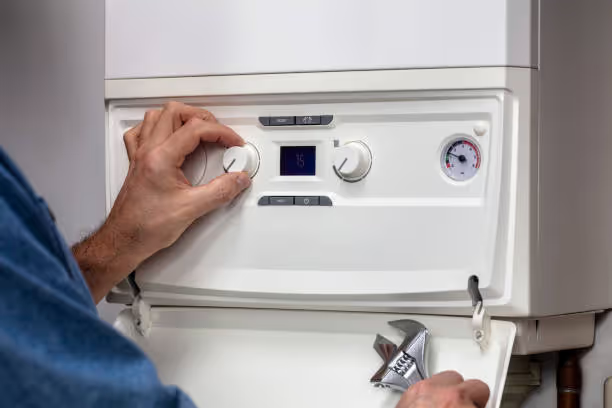Tankless Water Heater in South Tampa, FL

Discover the benefits of upgrading to a tankless water heater in South Tampa. Unlike traditional tanks, these on-demand systems provide an endless supply of hot water, significantly reducing energy consumption by only heating water when needed. You'll enjoy major energy savings due to Florida's warmer ground water, plus reclaim valuable space as these units are compact. Tankless water heaters also boast a longer lifespan. Learn about proper sizing, fuel sources (gas vs. electric), and the importance of professional installation and annual maintenance to ensure optimal performance and efficiency for your South Tampa home.

Upgrade Your South Tampa Home with a Tankless Water Heater
Imagine never running out of hot water again. No more scheduling showers, waiting for a tank to reheat after running the dishwasher, or settling for a lukewarm bath. For homeowners in South Tampa, this level of convenience and efficiency is not a luxury—it's a practical upgrade made possible by modern tankless water heaters. Unlike traditional storage tank models that constantly burn energy to keep 40 or 50 gallons of water hot, a tankless system heats water instantly, precisely when you need it. This on-demand technology provides an endless supply of hot water while significantly reducing energy consumption, making it a smart and sustainable choice for your home.
How On-Demand Water Heaters Work
A conventional water heater is essentially a large, insulated thermos that continuously heats and reheats a reservoir of water, leading to what is known as "standby heat loss." Even when you aren't using hot water, the system is using energy to maintain the set temperature.
A tankless water heater eliminates this inefficiency entirely. When you turn on a hot water tap, cold water flows into the unit through an inlet pipe. A flow sensor detects the water movement and activates a powerful heating element—either a gas burner or an electric coil. This element rapidly heats the water as it passes through a series of coils in a heat exchanger. The result is instantaneous, consistently hot water delivered directly to your faucet or appliance. Once you turn the tap off, the flow sensor deactivates the heating element, and the system shuts down, consuming zero energy.
The Clear Advantages of Going Tankless in South Tampa
Switching to a tankless water heater offers a compelling set of benefits perfectly suited to the Florida lifestyle. Beyond just convenience, these systems provide tangible value that enhances your home and lowers your monthly expenses.
An Unending Supply of Hot WaterThis is the most celebrated benefit. Whether you have a large family trying to get ready in the morning, guests visiting for the holidays, or you simply enjoy long, hot showers, a properly sized tankless unit will never leave you in the cold. It produces hot water continuously, for as long as you need it.
Significant Energy EfficiencyBecause tankless systems only operate when there is a demand for hot water, they can be 24% to 34% more energy-efficient than traditional storage tank heaters. For South Tampa homeowners, this efficiency is even more pronounced. The groundwater in Florida is naturally warmer than in colder northern climates, meaning the tankless unit has to work less hard to raise the water to the desired temperature. This translates into lower gas or electric bills month after month.
Reclaim Valuable SpaceTraditional water heaters are bulky, occupying a significant footprint in a garage, closet, or utility room. Tankless water heaters are compact, wall-mounted units, often no larger than a small suitcase. This space-saving design frees up valuable square footage that can be repurposed for storage or other uses.
Extended Lifespan and DurabilityA typical storage tank water heater has a lifespan of 10 to 12 years. In contrast, a well-maintained tankless water heater can last for 20 years or more. While the initial investment may be higher, the longer operational life and reduced energy costs deliver superior long-term value.
Selecting the Ideal Tankless System for Your Home
Choosing the right tankless water heater is crucial for achieving optimal performance. The two most important factors to consider are the size of the unit and the fuel source it uses.
Proper Sizing: Flow Rate and Temperature RiseThe "size" of a tankless water heater is measured by its flow rate, expressed in gallons per minute (GPM). This figure indicates how much hot water the unit can produce at any given time. To determine your required GPM, you need to estimate your peak hot water usage. For example, a standard showerhead uses about 2.5 GPM, and a dishwasher might use 1.5 GPM. If you expect to run both simultaneously, you would need a unit that can deliver at least 4.0 GPM.
The second factor is temperature rise—the difference between the incoming cold water temperature and the desired output temperature. In South Tampa, where incoming water might be 70°F, reaching a standard output of 120°F requires a 50°F temperature rise. This is a lower rise than in colder regions, allowing a single unit to produce a higher GPM and perform more efficiently.
Choosing Your Fuel Source: Gas vs. ElectricTankless water heaters are primarily available in natural gas, propane, and electric models.
- Natural Gas & Propane Models: These units typically offer the highest GPM flow rates, making them an excellent choice for larger households with multiple bathrooms and appliances. They require professional installation of ventilation pipes to safely exhaust combustion gases to the outdoors.
- Electric Models: Electric tankless heaters are often more compact and have a slightly lower upfront cost. They do not require venting, simplifying installation. However, they generally have a lower GPM output and may require significant electrical work, including dedicated circuits and potentially a panel upgrade, to handle their high power draw.
Professional Installation and Essential Maintenance
Proper installation is non-negotiable for the safety, efficiency, and longevity of your tankless water heater. A professional technician will ensure that all water, gas, and electrical connections are secure and up to code. For gas models, correct venting is critical to prevent dangerous carbon monoxide buildup.
To keep your system running at peak performance, especially in areas like South Tampa with hard water, regular maintenance is key. Mineral deposits (scale) from hard water can accumulate inside the heat exchanger over time, restricting flow and reducing efficiency. An annual system flush, or descaling, is recommended to remove this buildup. This simple procedure involves circulating a special cleaning solution through the unit, dissolving the minerals and restoring the heater to like-new condition. Ignoring this maintenance can lead to reduced performance, higher energy use, and eventual system failure.











